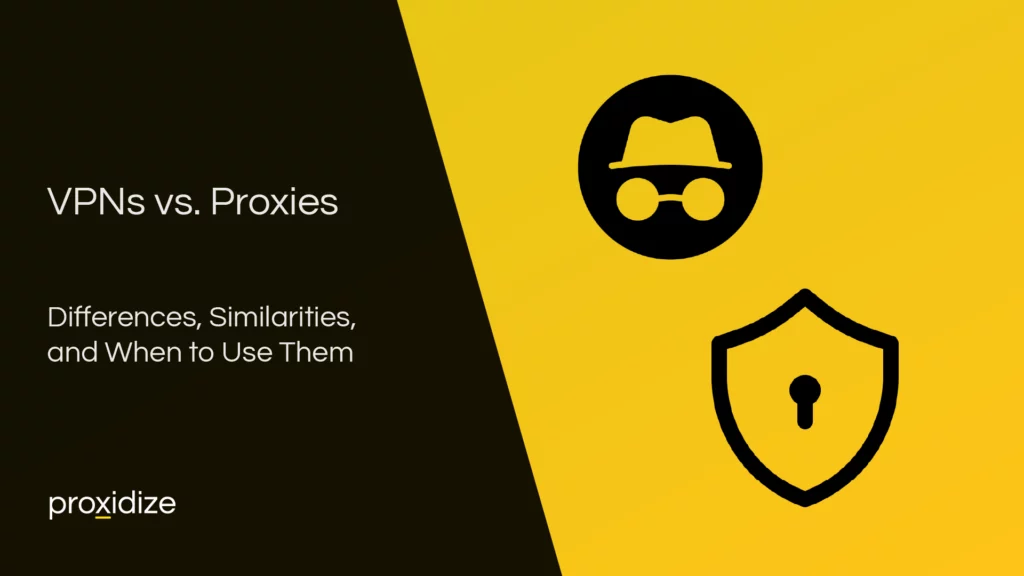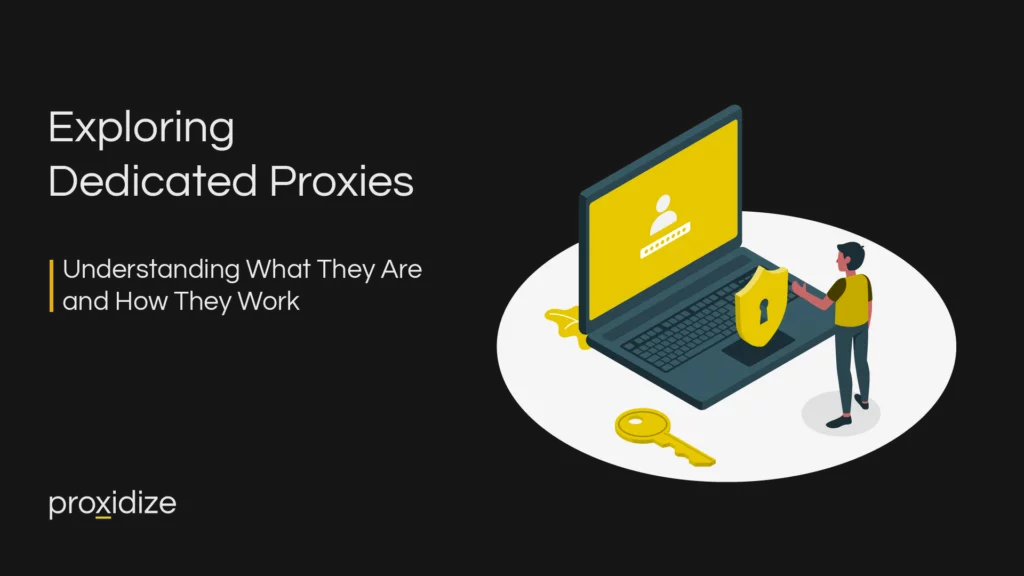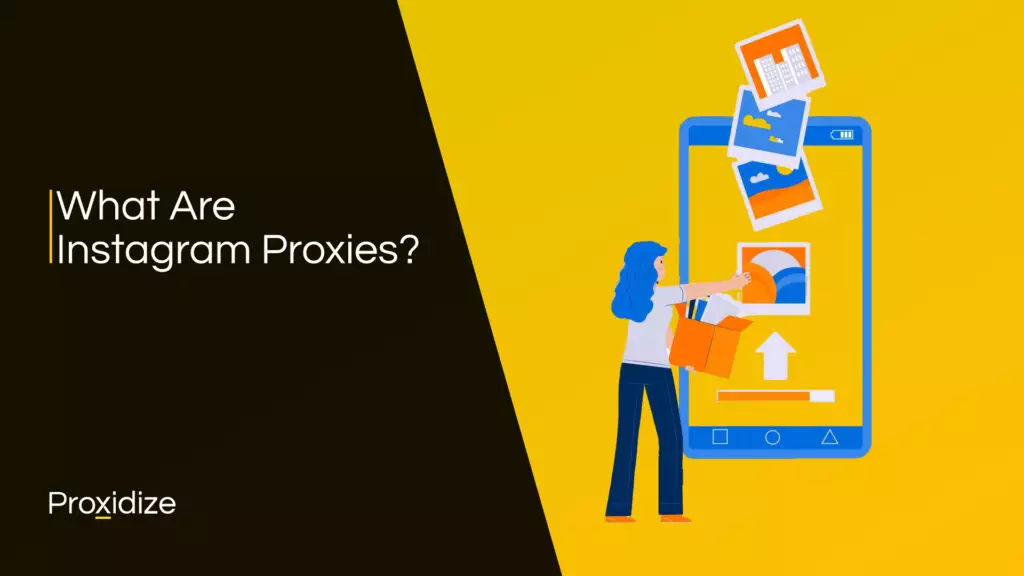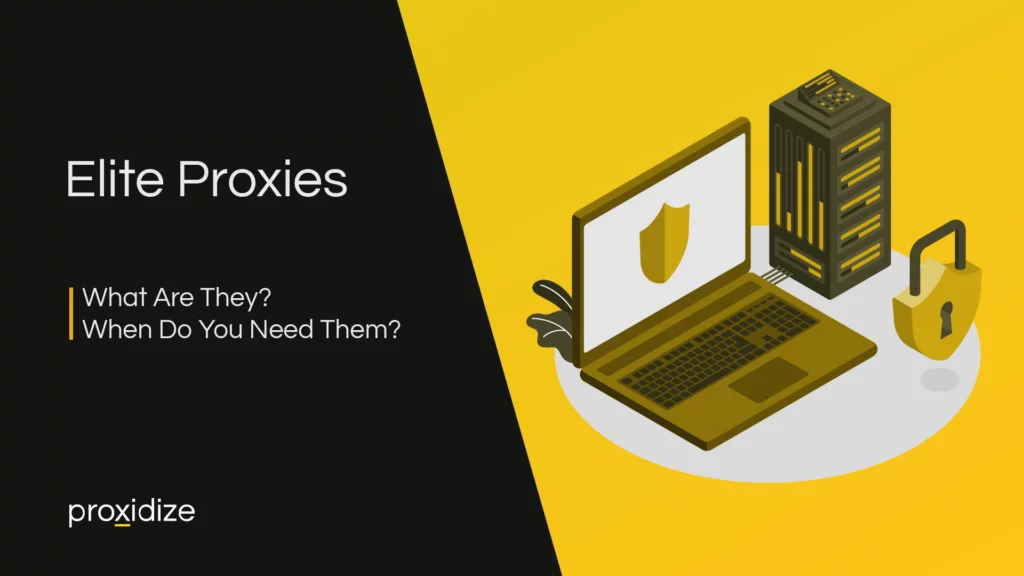Network anonymity tools are technologies designed to help users maintain privacy and anonymity online. These tools protect users’ identities and activities from being easily traced by third parties such as internet service providers, governments, advertisers, and malicious entities. In this article we’ll be contrasting VPN vs proxy, exploring their similarities and, crucially, their differences.
Network anonymity tools work in a few ways, usually by obscuring users’ real IP addresses among other things, but can vary in approach and effectiveness. They also have different use cases ranging from basic browsing privacy to more complex requirements like anonymous communication for whistleblowers.
Here are some of the most commonly used network anonymity tools:
- VPN
- Proxy Server
- Tor (The Onion Router)
- I2P (Invisible Internet Project)
- Anonymizing Overlays (e.g., ZeroNet, Freenet)
This article will be discussing VPNs and proxies, exploring the similarities and key differences between them, and discussing the various ways in which they’re used.
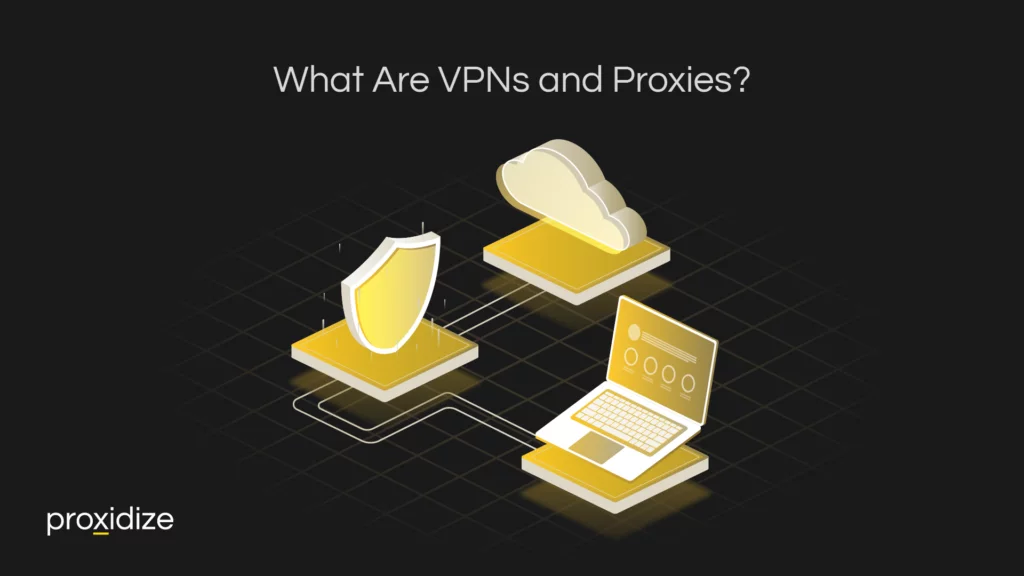
What Are VPNs and Proxies?
Let us start by establishing what a VPN and a proxy are. Both mask a user’s IP, route traffic through an intermediary server, enhance a user’s privacy to some degree, and can be used to bypass geo-restrictions. They differ in a few key areas, which we’ll discuss now.
Virtual Private Networks
A VPN or virtual private network is a server that allows users to connect to the internet through an encrypted connection to ensure online privacy and protect sensitive information. They are commonly used to secure one’s connection when using unsafe networks, like public Wi-Fi at airports or cafes.
A VPN encrypts the data that is transmitted through a process called tunneling. Tunneling protects data from eavesdropping and tampering and makes it difficult for internet service providers (ISPs), government entities, or hackers to spy on a user’s online activities or steal their information. By routing one’s internet connection through a VPN server, a user’s actual IP address is hidden and their data is shielded from external access.
There are many VPN providers available online and they offer a subscription to use their service. Once a user subscribes, they can choose from a selection of countries to reroute their internet connection through, giving them access to content that might be geo-restricted in theirs. Free VPNs exist; these usually only offer basic security features like IP masking and come with several security and privacy concerns. Free VPN services may log user data to sell to third parties to generate revenue, inject ads into users’ browsing experience, and generally suffer from slow speeds and overcrowded servers.
Proxies
A proxy server acts as an intermediary between a device and the internet. By routing one’s traffic through a proxy server, a user can mask their IP address, making it appear as though their internet activity is originating from the proxy’s location.
There are many different types of proxy server, usually differentiated by the origin of their IP address — residential, datacenter, and mobile. A residential proxy uses the IP address of devices usually found in a home, such as a personal computer or gaming console, designated by an ISP, giving the appearance that a user is using a real residential IP address. A datacenter proxy uses servers hosted in a physical location that hosts many servers that can reroute the IP addresses. A mobile proxy routes internet traffic through mobile devices connected to cellular network and therefore uses an IP address that corresponds to one used by a mobile device.
Free proxies also exist and you should never use them. They open users up to data and identity theft, and many of them will infect devices with viruses and malware.
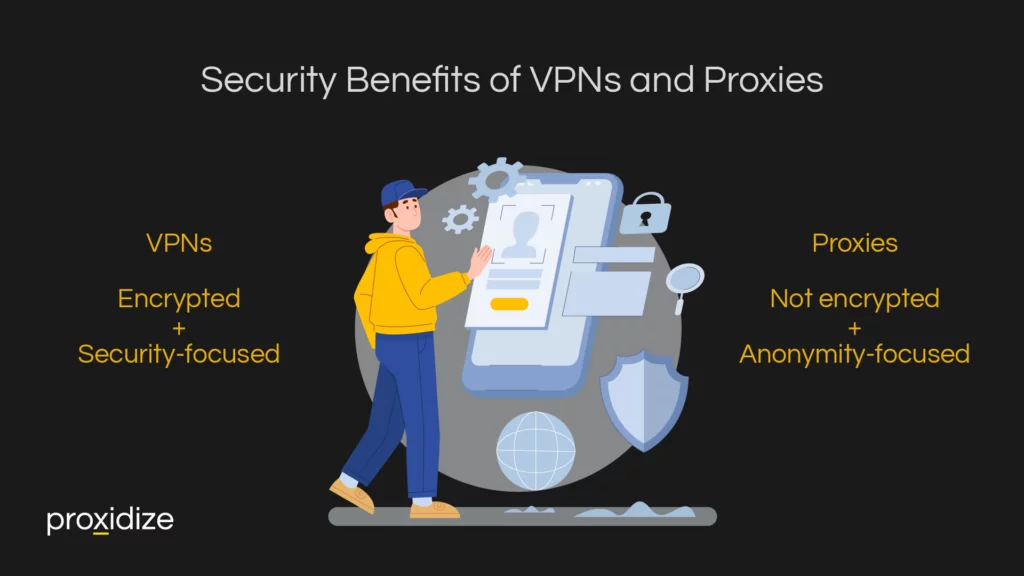
Security Benefits of VPNs and Proxies
When comparing the security benefits of VPNs and proxies, it is essential to recognize the strengths and drawbacks of each. While VPNs offer more robust security features, proxies still hold significant value for specific uses.
Security Benefits of VPNs
VPNs encrypt all data traffic between a user’s device and the VPN server, safeguarding it from eavesdroppers, especially on public networks. By routing the internet connection through a secure tunnel, VPNs protect all online activities, not just web browsing. This makes them ideal for protecting sensitive communications. They hide a user’s real IP address which makes online activities nearly untraceable and enhances privacy across the internet. VPNs offer a convenient blanket layer of security for all a user’s network traffic.
Security Benefits of Proxies
Similarly, proxies offer IP masking which assists in obscuring a user’s geographical location, keeping them hidden from targeted local attacks. Proxies offer higher speeds as they do not go through a VPN’s process of encrypting and decrypting data. Proxies work at the application level, which means that the user can decide whether all their network traffic gets routed through the proxy or only traffic from specific applications like a browser.
However, as we said, proxies don’t encrypt the data being routed through them. This offers anonymity from the websites one visits but not safety on the infrastructure being used (e.g. public WiFi).
IP Leak Prevention
Both proxies and VPNs can have their blindspots. IP leaks are possible, where a user’s real IP address is leaked by specific technologies. One can take steps to remedy this and protect from potential IP leaks.
Two of the foremost causes of IP leaks are WebRTC and DNS leaks. WebRTC, the technology behind browser-based peer-to-peer audiovisual communication platforms like the browser versions of Zoom and Google Meet, can bypass a proxy or VPN and expose a user’s IP. This happens as WebRTC tries to find the most efficient path for communication between two users. DNS leaks are caused by DNS queries accidentally bypassing your proxy or VPN as they’re sent through the DNS servers provided by your ISP. These queries aren’t usually encrypted.
An easy solution to both is to avoid browser versions of communication platforms and to manually set up DNS servers and turn on their encryption.
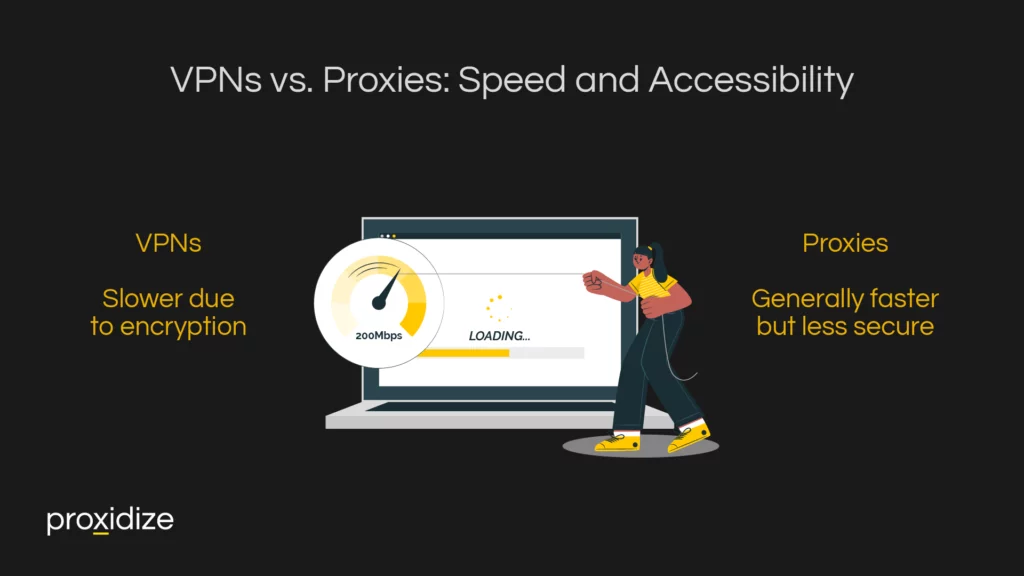
Speed and Accessibility of VPNs and Proxies
When comparing the performance characteristics of VPNs and proxies, two key factors often come into play: speed and accessibility. Each has its own set of advantages that can significantly affect user experience depending on the context of their use.
Speed
VPNs encrypt and decrypt data which can introduce a delay, especially the further away the VPN server is geographically from the user. This encryption is crucial for security but can slow down transmission speed. The speed of a VPN can depend on the quality of the VPN provider and the load placed on a select server. High-quality VPNs invest in powerful hardware and a broad server network to minimize speed losses.
Proxies generally offer faster speeds because they do not encrypt data. D ata can travel much faster, making proxies ideal for high-speed activities like streaming or browsing. Since proxies handle specific types of traffic, they can provide quicker response times for specific requests.
However, not all proxy types operate in the same way when it comes to speed. Residential proxies tend to be slower than other types as they route traffic through residential IPs, meaning that they vary widely depending on the actual internet connection of the home or mobile device through which the traffic is routed. Datacenter proxies are typically a faster type of proxy as their connection comes from servers hosted in one location with the sole intention of providing broadband for the proxies. Mobile proxies’ speed depends purely on the mobile network they are routed through and so, it will depend on the speed of the network.
Accessibility
VPNs typically route all of the device’s internet traffic through a VPN network, providing a uniform security level. This means that any application or server on the device can benefit from VPN protection without individual configuration. VPNs are effective at bypassing geo-restrictions and censorship because they can disguise all internet traffic as coming from different geographical locations. While proxies share this functionality, the proxy server must be placed in a specific location while VPNs can automatically provide access to an array of servers around the world.
Proxies tend to be easy to set up for specific applications such as web browsers, making them accessible to users who are not tech-savvy. Since proxies can be configured to handle specific types of connections like HTTP or SOCKS, they can be optimized for particular services or applications, enhancing accessibility for those specific use cases.
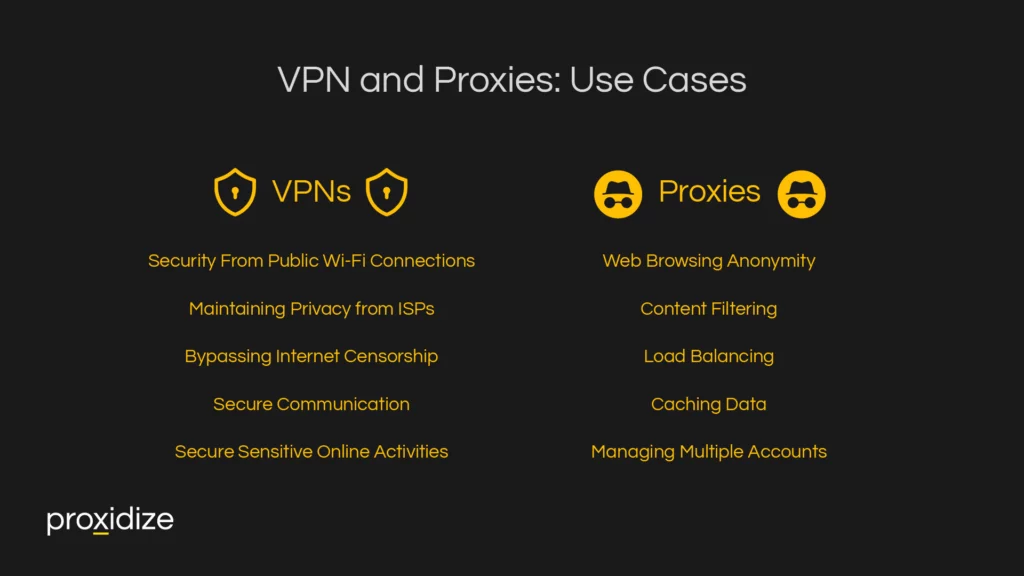
VPN and Proxy: Use Cases
While both VPNs and proxies can change your IP address, the typical marketing approaches reflect their differing primary uses and appeal to different segments of the population.
VPNs are often marketed to the public as a comprehensive security solution that provides privacy and security by encrypting all internet traffic and masking the user’s IP address. By comparison, proxies are typically marketed based on more specific use cases. They are often aimed at users with particular needs such as web scraping, managing multiple accounts from a single device, or bypassing geo-restricted content for business purposes.
Use Cases of VPNs
- Security From Public Wi-Fi Connections: VPNs encrypt internet traffic, which is crucial when connecting to unsecured public Wi-Fi networks like those in airports, cafes, or hotels.
- Maintaining Privacy from ISPs: VPNs prevent ISPs from tracking internet activities, including website visits and downloads. This is especially valuable in regions with strict surveillance laws. An ISP can still see that a VPN is connected and how much bandwidth is being used but they cannot see where that traffic is going, the websites being visited, or the specific content that is being seen by the user.
- Bypassing Internet Censorship: In countries where internet access is restricted or censored, VPNs help users bypass government filters and access the Internet, including social media platforms and news outlets.
- Secure Communication: VPNs are used to secure any form of digital communication, including VoIP calls and messaging, protecting data from eavesdroppers and cyber threats.
- Secure Sensitive Online Activities: When conducting activities that involve sensitive data, such as online banking or shopping, using a VPN can encrypt connections to prevent data theft, especially on public Wi-Fi networks.
- Safe File Sharing: For sharing files securely without exposing a real IP address and keeping a user’s P2P network activities private, a VPN is recommended to prevent interception by malicious actors. With most P2P connections leaking a user’s real IP address, using a VPN during a P2P connection typically does not leak a real IP address, as the VPN masks the IP with one of its server’s addresses.
- Connecting to Gaming Servers: Gamers often use VPNs to connect to game servers in different regions, reduce latency, and protect against DDoS attacks that could interrupt competitive gaming sessions.
Use Cases of Proxies
The marketing for proxies frames them as more use-case bound and niche when compared to VPNs and so the use cases associated will be more niche and specific; however, the main goal of being safer online remains true.
- Web Browsing Anonymity: Proxies can mask an IP address, allowing users to browse the internet without revealing their geographical location to websites.
- Content Filtering: Organizations use transparent proxy servers to filter and block access to certain websites within their network to enforce security policies or compliance standards. This is typical in educational institutions and workplaces.
- Load Balancing: Large organizations and service providers use proxies to distribute incoming requests across multiple servers, balancing the load and improving response times for high-traffic sites.
- Caching Data: Proxies can cache popular web pages and other content locally. This accelerates access and reduces bandwidth for frequently accessed resources, speeding up the user experience in organizational or network settings.
- Bypass Simple IP-Based Restrictions or Blocks: If a user’s access to a website is blocked through a basic IP-based filtering system, a proxy can provide an alternative route to the site without the complexity of a VPN.
- Managing Multiple Accounts: Digital marketers often use proxies to manage multiple social media accounts from one device without triggering fraud or spam alerts.
- Web Scraping: Proxies can be used to gather large amounts of data from websites without revealing the scraper’s IP address. This is important for avoiding IP bans or restrictions imposed by websites on scraping activities.
- Faster Browsing for Locally Restricted Content: Organizations can use caching proxies to speed up access to commonly visited websites by storing local copies of web pages.
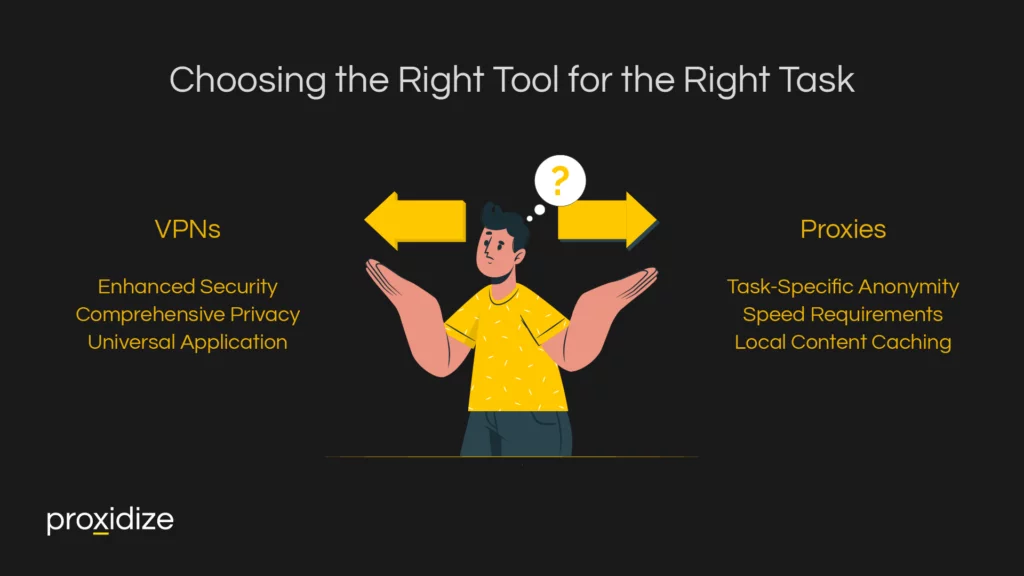
Choosing the Right Tool for the Right Task
While both a VPN and a proxy have strengths of their own, it is best to understand when one would be more useful than the other. Here’s a detailed discussion on how to choose the right tool for the right task:
Choosing a VPN
- Enhanced Security: If a user is transmitting sensitive information, especially on public Wi-Fi networks, a VPN’s end-to-end encryption ensures that their data is secure from onlookers.
- Comprehensive Privacy: VPNs offer superior privacy protections not just by masking an IP address but also by encrypting their entire internet connection. This is crucial if a user wants to keep all their online activities private from ISPs, governments, or potential snoops.
- Universal Application: A VPN affects all internet traffic from a device, not just traffic through a specific application. This is beneficial if they need consistent security and privacy across all applications, including background apps.
Choosing a Proxy
- Task-Specific Anonymity: If a user needs to quickly change an IP address to bypass geo-restrictions, a proxy offers the choice of safety or protection and offers the flexibility for task-specific anonymity. It’s particularly effective for non-encrypted tasks where high security isn’t a priority.
- Speed Requirements: Since proxies do not encrypt data, they generally offer faster connections. This makes them ideal for tasks where speed is a bigger priority, such as performing high-volume web scraping.
- Local Content Caching: Some proxy servers offer caching services that can store local copies of frequently accessed web content. This can significantly improve access speed for this content, reducing load times and saving bandwidth.
How to Decide?
- Assess Security Needs: If a user’s primary concern is security (e.g., protecting data on a public network), a VPN is the way to go. If they’re just looking to bypass a content filter or mask their IP for specific sites, a proxy might suffice.
- Consider the Impact on Speed: If a user is performing activities where speed is more critical than privacy (like streaming), a proxy could be better due to its lack of encryption overhead.
- Evaluate the Scope of Application: Think about whether a user needs the tool for a single application or your entire internet traffic. Proxies can be configured for particular applications, while VPNs secure everything.
Let us illustrate this with the use of two examples. In the first example, a user wants to scrape data from a company. They require anonymity from the websites they’re scraping in order to not get IP blocked and they want speed to efficiently scrape. They do not require the data to be encrypted to and from their device. As such, a proxy would be more appropriate. Additionally, the flexibility of rotating between proxies allows the scraper to minimize the chance of being IP blocked.
By comparison, when a user is out in the city for a coffee and realizes they need to transfer some money to someone, they require security more than anything else, including anonymity. The speed at which the transaction happens is less relevant than the integrity of the banking application. Therefore a VPN would be much more relevant than a proxy server.
By clearly defining what a user needs from these tools, they can select the most appropriate one that ensures they are equipped for the task at hand.
Conclusion
VPNs and proxies are essential network anonymity tools, each designed to meet specific privacy and security needs online. VPNs stand out for their strong end-to-end encryption, providing vital protection for users engaged in a broad range of online activities at the cost of speed. This comprehensive encryption safeguards data from potential interception, making VPNs especially valuable for sensitive tasks like remote access to corporate networks, secure financial transactions, and safeguarding personal data while on public Wi-Fi. By contrast, proxies offer greater flexibility and offer strong anonymity and privacy protection. This makes them ideal for activities requiring rapid access and frequent changes in IP, such as web scraping and managing multiple online profiles. In the end, the choice of which is better depends solely on a user’s needs and activities.


